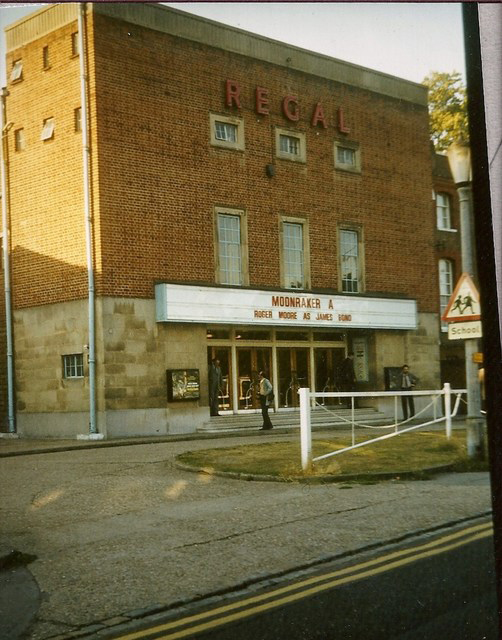
My path to Neil Young began with the Woodstock movie when it showed at the Marlow Regal, the local cinema just off the High Street, in the summer of 1970. We were going to festivals of our own all that summer.
I saw the movie twice in Marlow, bought the album, then called an LP, and loved Crosby Stills and Nash’s rendition of Steve Stills’ ebullient “Suite: Judy Blue Eyes.” That was enough to prompt me to explore these melodic rockers. I found the Buffalo Springfield’s “Retrospective,” Crosby Stills Nash & Young’s “Déjà Vu,” and Neil Young’s “Everybody Knows this is Nowhere.” It was the last that I felt the keenest.
Rumor had it that Neil had written three of the songs on the album, “Cowgirl in the Sand,” “Down by the River” and “Cinnamon Girl,” in bed with a high fever on the same day. Those three songs about women ran around and around in my head for a few years. In some sense they became me, or perhaps I became them: they became the language of my prolonged adolescence, a large helping of the ache I had already obsessed about for years, with a reassuring cinnamon aftertaste.
Love was a menu, not as it seemed at first a fixed recipe with a normally bad ending.

But of course, being obsessed made things as difficult for me as for Neil. “Old enough now to change your name, when so many love you is it the same? It’s the woman in you that makes you want to play this game.”
I ran away, like a startled kitten, when there was no need, again and again at the slightest emotional footfall, perhaps warily creeping back later to check things out. “Hello woman of my dreams.”
Terry’s letter arrived while I was doing pre-university training with the CEGB, having moved on from Harrogate to Birmingham. I was living in a bedsitter on the Chester Road, a mile or two from where mum’s parents were buried. I had written to Terry not long after returning from Canada the previous December, to let her know that I was going to come to see her again. It wouldn’t be right away, it couldn’t be right away, I had explained, because of a prior commitment in the shape of Imperial College, London, but I was going back to Canada as soon as I had the time and figured out how to save the money for the flight.
Even I realized early on that there were a lot of obstacles to overcome. I had kept to my schedule when she and I first met on my way across Canada, even though I had dearly wanted to stay and get to know her better. There was a plane to catch back to the UK, and a prestige University admission. In her letter, she let me know that she had moved to Edmonton, Alberta, not a major airline destination and thus not a cheap trip. She wrote that she was really happy that I was coming to see her, and accordingly had shared her happiness with Danny, her new boyfriend. My stomach sank and my eyes teared and I stared at the cars hissing by on the Chester Road in the rain. She may have crafted the message to land abruptly and with force, precisely to keep me away. It certainly landed hard. I felt ridiculous.

I had not been entirely celibate since returning from Canada, dating a fun girl named Patty for a short time near Marlow and almost dating a 30 year-old fully grown woman, Maggie, in Hartlepool. To pretend that I had been pining away would be an exaggeration.
But Terry was the girl who had stayed with me as the months went by. We had shared very little on my way back from Vancouver, over just a few days, and nothing that would be called real intimacy. Even as my stomach fell, I was admitting to myself that feeling such a shock made no sense really, and that it was all just in my head. There it stayed, the same constant ache that developed before boarding the plane home months before in Gander, the ache that grew unasked out of those few borrowed days spent with her in borrowed rooms in Fredericton, New Brunswick.
Logically, that should have been it. She was otherwise occupied, and so was I. There was nothing to regret in real terms. She had Danny, and in the fall I was starting my electrical engineering degree course. Every expense was covered by the CEGB scholarship, including books and sundries and room and board in the dormitory, and only excluding beer and the like, and I would be living for free in the middle of South Kensington, between Hyde Park and Chelsea in London. I was feeling less sure about wanting to be an engineer, but living in London still sounded fabulous. That was still a word at the time, fabulous, as in the “Fab Four,” and it described swinging London to a tee.

All I had to do was let Terry go. I have no clue why she didn’t go away. “Hello cowgirl in the sand, is this place at your command?” That was Terry for me, greeted by Neil Young in the midst of a barrage of machine-gun electric guitars riffs. “Can I stay here for a while? Can I see your sweet, sweet smile?”
I dropped out of Imperial College about half way through my first semester of a three-year electrical engineering degree, after writing a couple of letters full of adolescent social critiques to the editor of Felix, the college newspaper. Yes, the school was magnificently located within sight of the Royal Albert Hall in the heart of London, but it was heavily populated with the boys I knew too well from school in Marlow and the CEGB course in Harrogate. One on the course had altered my name on the cover of a notebook from Stock to Stocking!
London should have been enough to satisfy my diffuse longing for something more, something better, but no. I barely explored the concerts, good ones, all over town. For anyone looking for meaning, as I thought I was, London and the University were rife with associations and political groups, all sorts of social movements. I joined an organization called Third World First, which focused on sensitizing the industrialized West to the needs of the underdeveloped countries comprising the Third World. Nobody I talked to about it seemed to care, and I didn’t seem to care enough to work through that resistance. Belonging to such groups was basically a sales job at first. You have to believe in order to sell, and I didn’t believe enough. I tried to work up some kind of passion for it, to no avail.

Dad felt it coming with some angst and arranged for me to visit his former tutor at LSE, Nancy Seear, to discuss whether or not to stay in school. This was the only time he had introduced me to this influential woman from his past, indicating how important my staying at Imperial was for him. She and I talked briefly, with me trying to keep an open mind about what I was going to do. To be honest, my mind wasn’t that open though: I had barely cracked a textbook since arriving.
Underlying his genuine concern for my future, Dad was equally worried about the eventual costs of my losing the scholarship. The scholarship cut his costs of educating me to the bare bone. Lady Seear looked right at me and saw right through me and said that if I had decided what I wanted to do, then I should do it. I dropped out before the end of the first semester.
On December 14, 1971, I was on an Air Canada flight to Edmonton, Alberta. I was going to see Terry, but not right away. I didn’t have the inclination, strength or character to pursue Third World First’s admirable goals in London, but you couldn’t keep me away from Terry in Edmonton. The ache had not diminished over the year since we had met, despite the constant presence in my mind of her Danny, but I retained a little common sense.
I would get to know the city first, and then see how it felt. Maybe then I’d go see her, if I felt as if my feet were on the ground. That’s how I tried to see it, in a calm and abstract manner, despite the blind urge to get to Edmonton as soon as I possibly could. The stage was set for a good old-fashioned melodrama.

The day I arrived, I walked into the Student Union Building at the University of Alberta looking for a place to stay. Universities were the logical first step in such endeavors. The times were open to young drifters of different kinds, and students were more open than the average.
It was a welcoming and mobile time, and the axes of this mobility were often the colleges.
Despite arriving in the deep, dry cold of a Canadian prairie winter, I was not worried that I would end up even for one night without a place to stay, and this when I only had a few hours to find one. The first guy I hailed was a hippy in a flannel lumberjack’s shirt sitting behind a makeshift table set up in the foyer of the Student Union building. The colorful tablecloth was itself covered with the colorful home-made candles he was selling.
That was Ron Snyder.
We chatted. He couldn’t put me up because he did not have any extra space, but he had a couple of friends from the US, like him, who had a baby and a house and could perhaps help. They were Kathy Grant and Dennis Cruise, Shawna, their daughter, who was six months old, and Blizzard, their remarkable husky mongrel with his broad chest and unbridled enthusiasm for the cold outdoors. Their house was on the north side of the North Saskatchewan River in Edmonton.
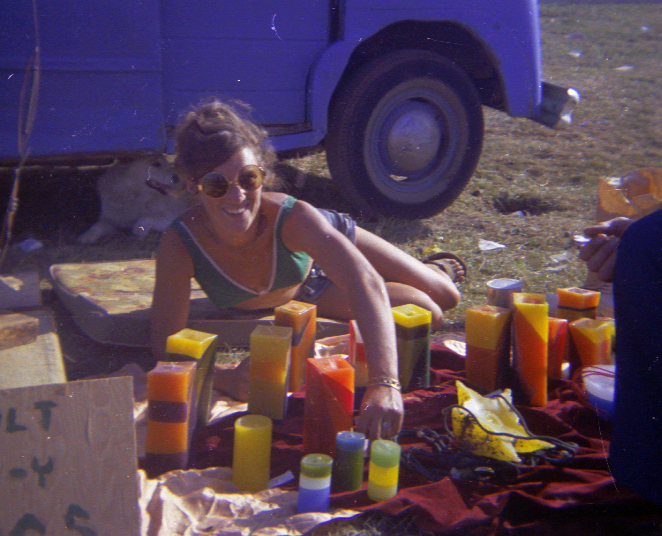
It had started well, and only got better as the weeks passed. Dennis was a psychology Ph. D. student, and somehow became a kind of unofficial counselor for me during the months in Edmonton, normally over a six-pack of bottles of Guinness in his home. That wasn’t his role in life, he was studying the chemical components of mental qualities, but he seemed to adopt it for me, and I was grateful. Kathy was bolstering their income from his teaching assistant work at the University by making and selling candles made of brightly colored wax, often primary colors or close to it. But she had a six-month old baby to take care of and could not spend a lot of time selling her colorful candles. She had been looking for someone else to sell them for her, on commission. I became that someone.
So a place to stay, emotional support and a job, all in the first place I fell into! It’s not surprising that Ron and Dennis were still my friends 40 years later, and Kathy still would have been if she had remained in California.
Ron accompanied me on my first and only visit to the Chicago Pizza Restaurant on Edmonton’s north side, where Terry was waitressing. It was a cold January evening around dinner time.
As we got to know each other, I had explained to Ron what had happened with Terry, very little really, and how I felt about it, quite a lot in one way or another.

I told him that my visit to her restaurant was not goal-oriented, because I was sure that her boyfriend was still around. Rather, I just wanted to see her again. Her letter had been clear enough that she was happily settled. But she still wanted to see me, she had written. That was confusing, but I did not hold her responsible for my going to see her. I didn’t know why I was going to see her, I didn’t even know why of all places in the world to go after dropping out of Imperial College I chose Edmonton, Alberta in winter. I didn’t even realize how driven I was. Ron came with me to the pizza joint, because he was like that.
Terry was busy waiting tables, and did not have the time to say much to us. She told us that she’d sit with us when she had her break, and maybe she would have. But her boyfriend arrived first. I had no idea who to expect, of course, just as I had no idea that she would have agreed to call her boyfriend if I ever showed up at her work.
Danny was tall, fair-haired, blue-eyed and built like a Mack truck. He looked like a much better built version of me, taller, broader across the shoulders, a barrel chest. Most importantly, he wore a black leather jacket with lettering on its back announcing “Warlords.” The bottom fell out of my stomach, and I was short of breath.
Danny was a biker, a serious biker in an outlaw motorcycle club, with colors and all. Terry had neglected to mention that, in her letter or when we had talked over the phone after I arrived in Edmonton. We hadn’t talked a lot, maybe once or twice, but from my perspective, Danny’s biker club membership would have been very useful information. Terry seemed to disappear as soon as he arrived, or maybe it was simply that Danny filled my field of vision, and not because he was so big. When he looked at Terry, he almost seemed to have kind eyes, but how kind could a Warlord be to someone he perceived as a rival? My chest was pounding. I was scared shitless. It was all so unexpected. I had imagined various and intricate scenarios of how seeing Terry would be, and not one of them involved an outlaw biker boyfriend with a bone to pick.
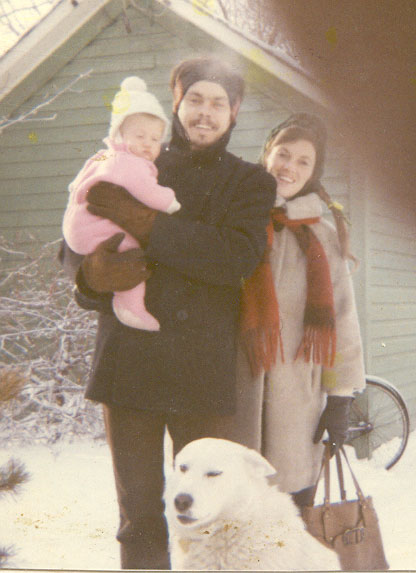
Danny invited me to accompany him into the Chicago Pizza’s men’s bathroom. Not exactly the kind of invitation that inspires enthusiasm, but I wasn’t about to refuse this guy anything. It was already clear that he was not all that happy with me, and I certainly did not want to cause his mood to deteriorate. With an impressive display of courage, Ron Snyder followed us into the oversized bathroom facilities and stood in front of a urinal. Danny and I were standing in front of the sinks. I was breathing deeply, trying to calm myself. Ron stood in front of that urinal for several minutes, until Danny quietly told him to leave, gesturing toward the bathroom door. He did not raise his voice above a whisper, just letting him know that he needed to move on. Now. Danny was clearly accustomed to getting what he wanted with no more than a gesture. I did not want to annoy him any more than my presence already had, and motioned for Ron to leave.
“Are you sure you’re going to be all right?” he asked before moving away from his urinal.
I replied, “sure, don’t worry.” I was lying, but Ron had the good sense to leave anyway, even if he realized that I was just reassuring him. The only way out of this one was to play it Danny’s way. I was reassured that he hadn’t pounded me as soon as we were out of sight of the people in the pizza house. Ron was kind, but he was not a big guy. Nothing about him would have deterred Danny, who apparently wanted to hear what I had to say and think it through first. I was concentrating on not panicking and expressing myself honestly. Instinctively, I was sure that my only chance was to be straight with him, as straight as I could.
“I’m a good talker . . . ,” I began.

“Doesn’t sound good to me,” he retorted in a flash, before I’d even had time to finish the sentence. Okay, okay, I thought to myself, don’t try to be too clever. He’s quick as well as big.
“. . . And so people don’t always believe me when I’m sincere. But you have to see that I’m not here pursuing Terry as a girlfriend or anything. That’s not it. I don’t really know what it is, but she made it very clear to me as soon as you guys got together that she was involved with you. She wrote it to me. I’m not the kind of guy who would sleaze around on the side. I just wanted to see her again, but I don’t want to go out with her.” Fortunately, if bizarrely, this was all true. “We never dated or anything. She just . . .”.
He jumped at that, and easily but quietly interrupted. “You never went out with her?”
“No, it just never happened, even though we did spend a few days together.” I paused. He visibly liked that.
“That’s what she told me.” The wall that his face had become gave a little. My story was matching hers. That was evidently reassuring. He motioned me to keep going.
I don’t remember where I went with what I was saying after that first glimmer of safety. I instinctively knew to stick like glue to the truth with this guy. He would smell bullshit a mile away, and without a shadow of a doubt would be seriously offended by it. The fluorescent lights in the bathroom made our faces look pallid and grey in the mirror as I chattered on. I looked him in the eye from time to time, and from time to time studied the two of us carefully in the mirror above the sinks. I needed to see this. It was one of those seminal moments, alone in a pizza parlor rest room flirting with disaster.

In the mirror, I looked bigger than I felt. He didn’t say a lot, but he was visibly relaxing. I may have looked ridiculous to him. Maybe that was what saved me. It was strange, even wimpy, to be in Edmonton with no intention of dating the girl I had followed there. But it was also true, and telling the truth was what was really saving my skin here. Whether it was because I looked wimpy or not, I posed no real threat to Danny. When he was satisfied that this was the case, he motioned me to follow him out of the bathroom, and walked me back to the table where Ron sat, cradling his beer and brooding. He looked relieved when he saw me, and smiled. I picked up my glass, toasted my appreciation of his courage, and thanked heaven for still being on one piece.
After exchanging a few words discretely with Terry at the counter, Danny walked outside and started the Harley with that trademark guttural roar. Away he drove from the Chicago Pizza, and the roar first flared up as he accelerated up through first and second, and then died away as he left us behind. I tried to remember if he wore anything warmer than the leather jacket with the colors on. Wasn’t it too cold to ride a motorcycle, even for the motorcycle?
How things evolved in the pizza place after that terrifying little chat in the bathroom is long gone. Did Ron and I finally talk with Terry? We must have, but I can’t even remember what was said. I think that she was relieved that Danny had not beaten me up, even though when she said that she also said that she was sure that he would not. She bubbled with relief, as I did. “Hello Ruby in the dust: has your band begum to rust?” The Chicago Pizza evening remains the evening I almost got the shit kicked out of me by a well-built, soft-spoken biker wearing real colors that were the hardest colors in town and with more natural authority than the average judge. Ron and I did get a little drunk.

Walking back to Kathy and Dennis’s place late that night took a while, and it was very late by the time I started out. Ron left separately, because his place was quite a distance from Kathy and Dennis’s. I normally enjoyed long walks in the freezing city, and figured that it would be the same this time even though I was a little unsteady on my feet. The cold kept the sleepless indoors, and there were no pedestrians and very little traffic.
The bridge is called the High Level bridge. It crosses over the ravine that the North Saskatchewan River flows through on its way northeast to the Hudson Bay. It was about 150 feet above the river. The railway track was on the top deck, and the road was below. For the first and only time, I took the top deck that night. If I kept to the middle of the track, there was little room to slip through the sleepers and on to the roadway. I toyed with walking at the edge of the bridge, where only about one in three of the sleepers in the middle extended. That appealed to the dramatic in me, risking a drunken fall on to the roadway below, or even into the ravine. Slip-sliding across the bridge, I was sensible enough to stick to the middle of the track, with only the arrival of an unexpected Canadian Pacific train to fear. And if one did, I could crawl out on to the extended sleepers at the edge. Even at three in the morning, downtown Edmonton sparkled for me in the freezing air across the ravine. It was only later that I wondered what I was thinking that night when I set off to cross a half-mile long bridge on its railroad track when there was a road available.

I did spend time with Terry once more during that trip. Maybe she called me at Kathy and Dennis’s, or maybe I called her. I think that it was the former, because Danny was out of town when we met up. I wouldn’t have known when he wouldn’t be there.
She invited me into her home, or perhaps it was a friend’s home. We ended up in a small bedroom with a single bed up against the wall. I have no recollection of how we got there. It must have been her friend’s home. I paced backwards and forwards for a few minutes, and then sat myself down on the floor. She looked at me as if she didn’t know what to do with me.
We are alone in a bedroom with only a bed to sit on, or lay on, and I’m sitting on the floor, my back squeezed into the corner. She knew what she was offering. If I had come all this way to see her, this was the least that she could do. My guess is that she actually did think it through that way, or something like that way. I stayed on the floor until I left, my stomach twisted and my mind a little lost. There was no room next to me even if she had felt inclined to come down to my level and push the point. After not very long, I made my excuses and walked off. There was nothing else to do, even if she wanted to be kind. “Hello woman of my dreams. This is not the way it seems. Purple words on a grey background: to be a woman and to be turned down.” That’s not what I was there for, Terry, a quickie in somebody else’s bed and au revoir. I still didn’t know what I had come for, but it wasn’t that.
The night at the Chicago Pizza Parlor had released me. Meeting Danny had explained a lot, in a way that permitted me to retain my earlier idealized picture of Terry and me. There had been something there, something special, but I had gone away and then stayed away. She was so alone: part of what had so moved me in Fredericton was how terribly alone she was, with no direction home that did not involve passing by her perverse stepfather. She was alone, felt that she needed protection above all else, and I was thousands of miles away mumbling about distant plans to come visit. Danny was the perfect protector for a vulnerable girl. Even I could see that.

The story was complete, even if I had misunderstood much of it, and I was free to move on. In part, freedom is understanding what was holding you back.
I was in Alberta again the next summer, 1972, working at one of the best jobs that I ever had. This was right after Adrian and I fell apart. Pierre Trudeau was then the Prime Minister of Canada, a debonair young leader with a vision for his country. He came to power during the period when Quebec radicals were demanding independence from Canada, or at least a fair shake for French Canadians, and had figured out that the future depended on the young of both languages overcoming their parents’ ingrained prejudices. So he adopted a policy of encouraging Canada’s young people to travel across the country during their long summer vacations, and get to know each other. He did this in part by creating a string of temporary summer youth hostels all across the country, from Newfoundland to Vancouver Island, where the young were welcomed for about a dollar a night.
The New York Times covered this policy, strange from a US perspective, in a wordy article published in April 1973 entitled “Youth in Canada: Drifting Around with the Government’s Blessing.”
Here’s a taste: “A strong case can be made, in fact, that bumming around is the most valuable kind of travel, particularly for those who are visiting an area for the first time and are not afraid to sleep outdoors once in a while. The basic service that the Government provides for such travelers is a nationwide network of youth hostels. The financial investment is actually quite small ($1.2‐million in 1972 for 96 hostels) . . .”.

As a participant, I confirm that it worked wonders for a wide range of Canadian youngsters, bringing them to where they would not have dared go without these welcoming, government subsidized hostels. Miraculously, and despite being a Brit, I became one of the lucky few who benefited the most from the money that the government spent. The Banff hostel needed a bookkeeper when I was passing through, and convinced that my math aptitude would easily translate into an aptitude for bookkeeping, I announced that I was qualified and, miracle on miracles, was given the job. The money was poor, of course, especially for a professional job, $70 per week plus room and board, but everything else was perfect. Except that I was wrong about math abilities turning into accounting abilities. Accounting employs a whole different language, which I did not know at the time. Sorry, people.
To get a sense of why this was one of the best jobs that I ever had, it helps to start with Banff. It is extraordinarily beautiful. The town is nestled in the Bow River valley beside the transcontinental railroad and the Trans-Canada Highway, near a hot springs in the middle of the Rocky Mountains. The Canadian Pacific Railroad, run by earlier Canadians with the dream of bringing their scattered and dispersed country together, recognized its natural beauty and named the area after the home town of one of the company’s Scottish Directors. Within a few years of opening the railroad from Montreal to the Pacific, they had built a grand hotel there, called the Banff Springs Hotel, and another nearby, the Chateau Lake Louise. Designed to bring travelers by train across the enormous, empty land, the railroad’s grand hotels were a great commercial success, and the success of the Banff Springs Hotel was unequalled. Canada’s first National Park was created around the hotel, literally. It was rebuilt to expand its facilities several times over the ensuing decades. The tourists came right away, and more and more of them have been coming ever since.

Everyone who comes to Banff when the sun is shining and the air is still stands and stares in awe. It is a mountain paradise. The hostel where I worked was set up in a clearing in the forest on the outskirts of town, along a fire trail a short walk from a traffic circle on the Trans Canada Highway. There were camp beds in tents for the people passing through, and living and dormitory trailers for the staff, as if we were loggers or construction workers on a site. I was given a single bedroom in one of the dormitory trailers, a tiny little space, but warm in the chill Rocky Mountain nights.
More important than the beautiful land and the unique living space were the human surroundings. Almost everyone working at the hostel was a student working her or his summer vacation. Almost everyone passing through, every customer as it were, was a student on her or his summer vacation. The hostel was a community of young people on vacation with each other and freed from the constraints of their parents, homes, colleges and communities. There wasn’t time to form cliques: those passing through were limited to three nights before they were required to move on.

There was time to do one thing, and that was to meet other people travelling like you, on holiday like you, away like you, alone or with one or two friends like you. I travelled mostly because I had to, the impulse was insurmountable. In more rational moments, I noticed that doing so had the effect of freeing me from myself, from the locked-up emotional patterns of my childhood. The same was true of almost everyone staying at the hostel, guests and staff alike. Not that we talked about that, or even analyzed it in those terms. Not that their childhood patterns had anything to do with mine. We just behaved differently, more openly, taking more risks, having more fun, letting it out.
Our dormitory trailers and dinners cooked in a trailer’s kitchen did not change that we were all basically camping in the forest together. We sat on logs and walked barefoot in the dirt. In the evening, there was almost always a group of us sitting around the campfire, watching it flicker and burn under a canopy of a million stars. The summer sky was so clear at night high in the Rockies that you felt as if you were in a spaceship, with stars and galaxies so close and bright that you could throw stones at them and, if you were on target, they would scatter like ripples in a pool. Shooting stars raced through the firmament, and just as quickly dissolved and disappeared. The embers in the campfire glowed and shimmered and the smoke wafted away, drifting languidly up and up, floating backwards or forwards, left or right, in the slightest breeze.
There were four or five of us around the campfire one evening. It started out like many others. After putting away the hostel’s books for the night, I left the trailer where I’d been dutifully listing income and expenses to sit out by the campfire, smoke cigarettes and watch those astonishing stars. A beautiful brunette was sitting nearby. I had noticed her earlier in the day, shared a few words with her, and sitting next to her beside the campfire managed not to offend her with some dumb comment. Patterns of conversation need occasional disruption.
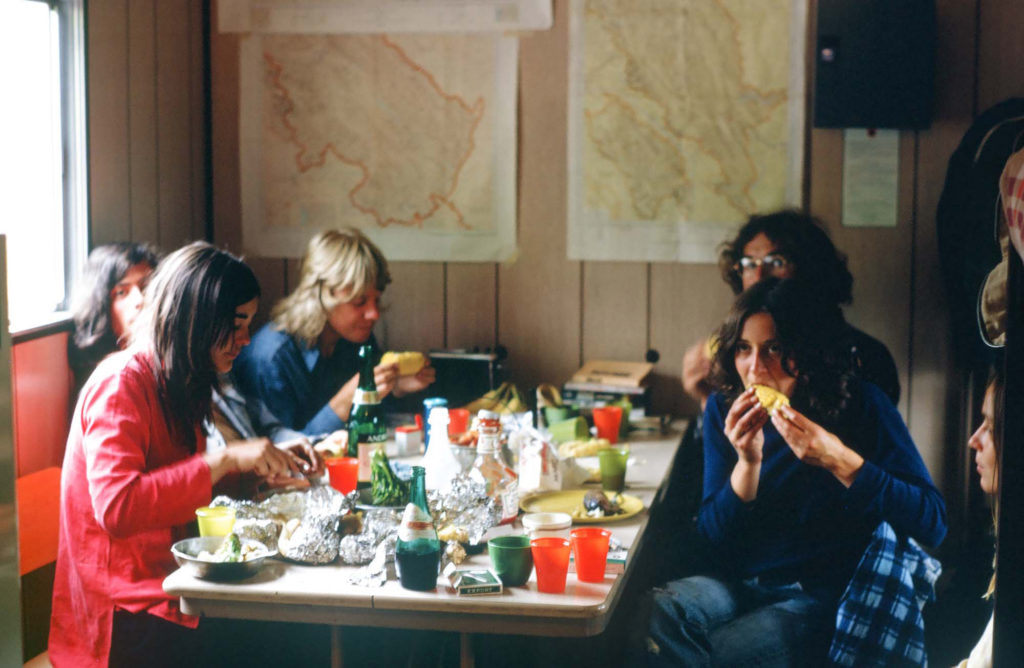
She told me that her name was Susan and that she was traveling alone on her way from North Vancouver back East, intending to meet up with one of her parents. I forget exactly where she was going, and which parent, and for some reason didn’t even believe that she had given me her real name. She was intelligent, friendly and open, as well as gorgeous, and didn’t seem to notice how scruffy I looked. She was out of my league, or at least would have been anywhere but that hostel. My guess is that she would not have looked at me anywhere but that hostel. But this was a magic world of young people freed from their pasts and their prejudices. On some level, she liked the look of me.
During a lull in the conversation, and with a feeling of intense excitement in my chest, I asked her if she would like upgrade her tent accommodations and sleep in a bed in the trailer. With me, that is. I never could do this, ask a girl outright, and never did in the ordinary course. Here I said it with a smile, perhaps even a little charm, because I wasn’t as scared as I normally would be. I said it because the still night air was cooling down by the campfire and because I’d known her for a couple of hours and knew that she would soon leave, both the campfire and the hostel. I said it because I could tell that I had a chance.
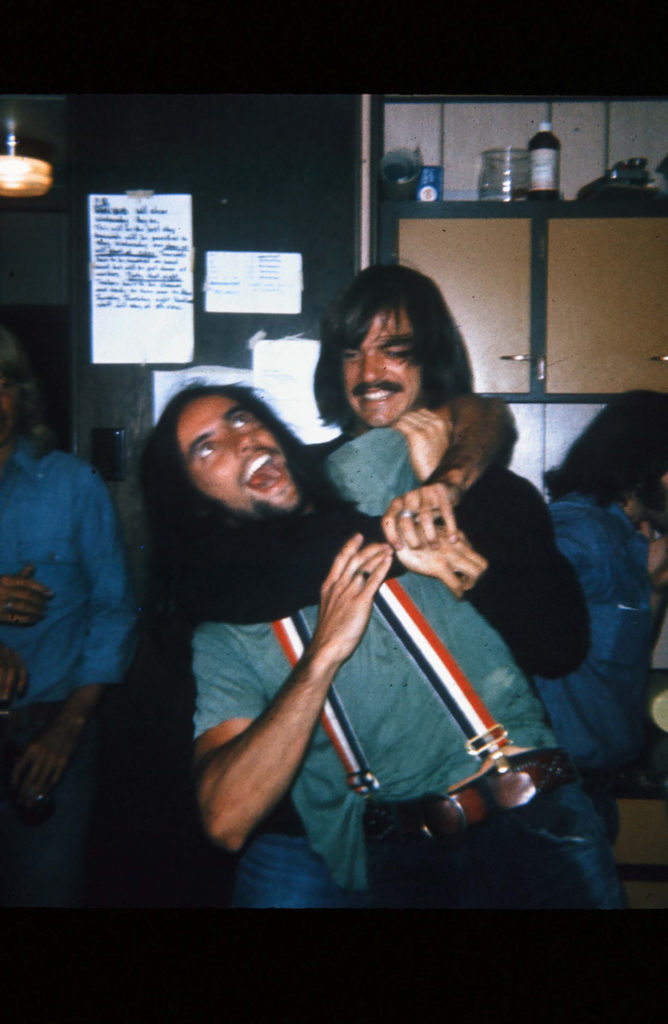
She nodded no, and looked away, and my stomach did a few flips. That was why I never did ask a girl so directly, to avoid dealing with rejection. There were a few awkward moments. But I didn’t run away, my normal pattern after any kind of slight, because the fire was the only warmth left outside and I was not yet ready to sleep. I was watching the embers flicker and burn as the logs lost their earlier form and disintegrated. She too stayed where she was, and we were both sitting there as my stomach calmed down. The splendor of our canopy of stars and galaxies comforted us both I think, and we talked about other things. Soon we were the only two left as the fire died down and evening in the Bow River valley drew to a close.
It occurred to me all of a sudden that she was still there. She had said no, but she hadn’t left the campfire. Or me. “You’re still here!” I exclaimed, smiling like a fool and taking her hand in mine. I never did that either, never acted in a way that a girl had told me not to, taking her with me after she had verbally refused. But I did that night, and holding her hand gently but firmly I led the girl who told me her name was Susan back to my little corner room in the trailer.
I felt like singing out loud, but the song just played on in my head. “I’m gonna live with a Cinnamon Girl, I could be happy the rest of my life with a Cinnamon Girl. A dreamer of pictures I run in the night, you see us together, chasing the moonlight, my Cinnamon Girl.” She was shaking almost as much as I was, on the walk to the trailer and when we faced each other inside. But she did not resist, not one bit. Each of us was free and wild in ways that I for one had never been before.
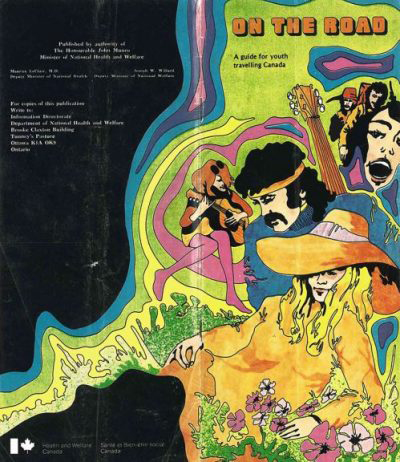
I was half awake as she dressed herself in the morning and kissed me goodbye. “Do you have to go so soon?” I asked, confused, even though this very transience was likely what allowed her to stay with me in the first place. Didn’t she enjoy herself as much as I had? It was inconceivable to me as she quickly bent down and kissed me that she was going to leave. I should have hauled myself out of bed in any event, but was tired and relaxed after such a short night’s sleep and a long evening’s exertions, and fell back asleep almost immediately.
I woke up with a warm glow inside, expecting to see her later in the day, but they told me that she had checked out after breakfast.
We had been ships passing in the night. She was traveling, and that was it. I felt a real regret the day that she left, a sense that we could have really made something together. But maybe she was already in a committed relationship. Who knew? What stayed, what I would remember moving on, were the lightness and joy that she had brought into my life. Going forward, dull aches like Terry would instill themselves from time to time, and so would warm glows like Susan. “I could be happy the rest of my life with a cinnamon girl!”

